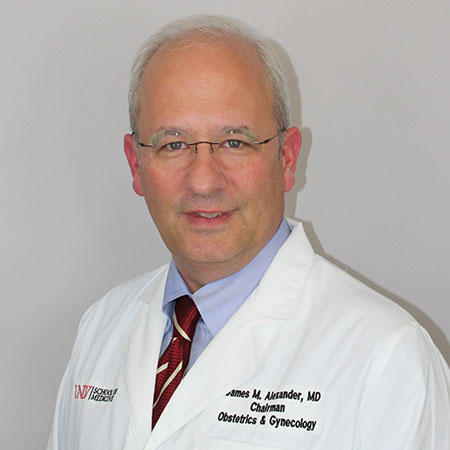James M. Alexander, M.D., ’91
Delivering Excitement

The new chair of the School of Medicine’s ob/gyn department says that even after decades, delivering babies still is exciting.
When Dr. James Alexander, the new chairman of obstetrics and gynecology at the UNLV School of Medicine, talks about the importance of research to patients, his Texas accent becomes hotter than a two-dollar pistol.
This native of Dallas can’t help getting passionate when he talks about how research can help clinical outcomes. And when he does, he tends to use “Mamas” instead of “Mothers,” much like Willie Nelson and Waylon Jennings did with their, “Mamas, Don’t Let Your Babies Grow Up to Be Cowboys.”
“I know should use ‘mothers,’ but it (the Texan) comes out on me sometimes,” he said.
Extensive Research
Make no mistake: Alexander doesn’t just talk about research, he does it. His 69 journal articles have appeared in renowned publications such as the American Journal of Perinatology and the American Journal of Obstetrics and Gynecology. They cover everything from “Effects of Magnesium Sulfate on Preterm Fetal Cerebral Blood Flow Using Doppler Analysis” to “Hypertensive Emergencies of Pregnancy.”
The author or editor of 10 books, he’s been one of the writers of three editions of “Williams Manual of Obstetrics,” the companion to the textbook Williams Obstetrics, which has been the premier reference in obstetrics for more than a century. One reviewer described the pocket-sized manual as, “The authority of Williams Obstetrics in a portable package.” For two editions of the textbook, Alexander has been a contributing editor. Said a reviewer, “Ob/Gyns don’t need to be told about this book; They swear by it.”
“I really like having science behind what I do,” Alexander said. “That way you do interventions that you know will help. It helps patients have better babies.”
Recently, the UNLV School of Medicine department of obstetrics and gynecology received a $23,000 grant from the March of Dimes to study the effects on pregnancies of long-acting birth control, such as intrauterine devices (IUDs) or implantable hormonal devices.
Alexander said it might be that long acting birth control — where a woman doesn’t have to remember to take a pill or get a shot — could become the recommended and cost-effective safe way for women to control birth spacing, which would result in better birth outcomes. He noted that research has shown that pregnancies that start less than 18 months after a previous birth are associated with delayed prenatal care and adverse birth outcomes, including preterm birth, neonatal morbidity, and low birthweight.
“The March of Dimes is excited about this research and so are we,” he said.
Before coming to UNLV in July, Alexander held a similar position with the University of Arkansas for Medicine Sciences in Little Rock. He also has been a professor in the division of maternal fetal medicine at the University of Texas Southwestern Medical Center in Dallas.
Alexander wants the research done by ob/gyn faculty investigators at UNLV to develop into a statewide resource. “We’re not only training doctors, but want to help the entire state.” (The ob/gyn department, which will have a total of 24 residents, also trains physicians based at Nellis Air Force Base.)
Finding His Passion
It was while he was a third-year student at the University of Texas Medical School at Houston that he developed his passion for ob/gyn. “Professor Valerie Parisi took me under her wing and really got me interested,” he said, adding that she helped him obtain a residency in the field at the University of Alabama Birmingham. That training was followed by a fellowship in maternal fetal medicine at University of Texas Southwestern Medical Center.
“A good teacher in medicine makes a huge difference,” Alexander said. “We need to find more ways to reward them…a teacher is why I’m in the field I’m in today.” Even with all the technological advances now found in medical schools, he said, what a doctor imparts to a student is critical. For that reason, he calls the study of medicine “an apprenticeship.”
With 12- and 16-hour days not uncommon for much of his life in medicine, Alexander said that in his family hard work was always the norm. “Our history was basically that of laborers,” he said, noting that his father worked on the railroad. While his dad’s work put food on the table and a roof over Alexander’s head, there was no money to send him to college. He qualified for a financial need Pell Grant, which he combined with various jobs, including working as a lifeguard, sacking groceries, waiting tables at Red Lobster, and selling auto parts, to get through college.
There was no “magic moment” in which he decided to become a doctor. “I loved biology and science, and it just seemed like it would be a profession that made good use of my skills.”
It was while he was working at a recreation center that he met the woman who would become his wife.
“We dated for just three months and my mother asked me if I was sure I wanted to get married going into medical school,” he recalled. “I told my mother I knew she was the one for me, and she has been. We’re together after 31 years with two beautiful daughters. I couldn’t have come this far without her.”
Easy Choice
Alexander says his decision to come to Las Vegas wasn’t a difficult one.
“I’m in my 50s, in good health with plenty of energy and have a chance to make a difference at a new medical school. How many people get to do that?”
After decades of helping bring babies into this world, how does he feel about the experience today?
“Delivering babies is still just as exciting now, if not more so, than when I started.”
Link to original article can be found here.